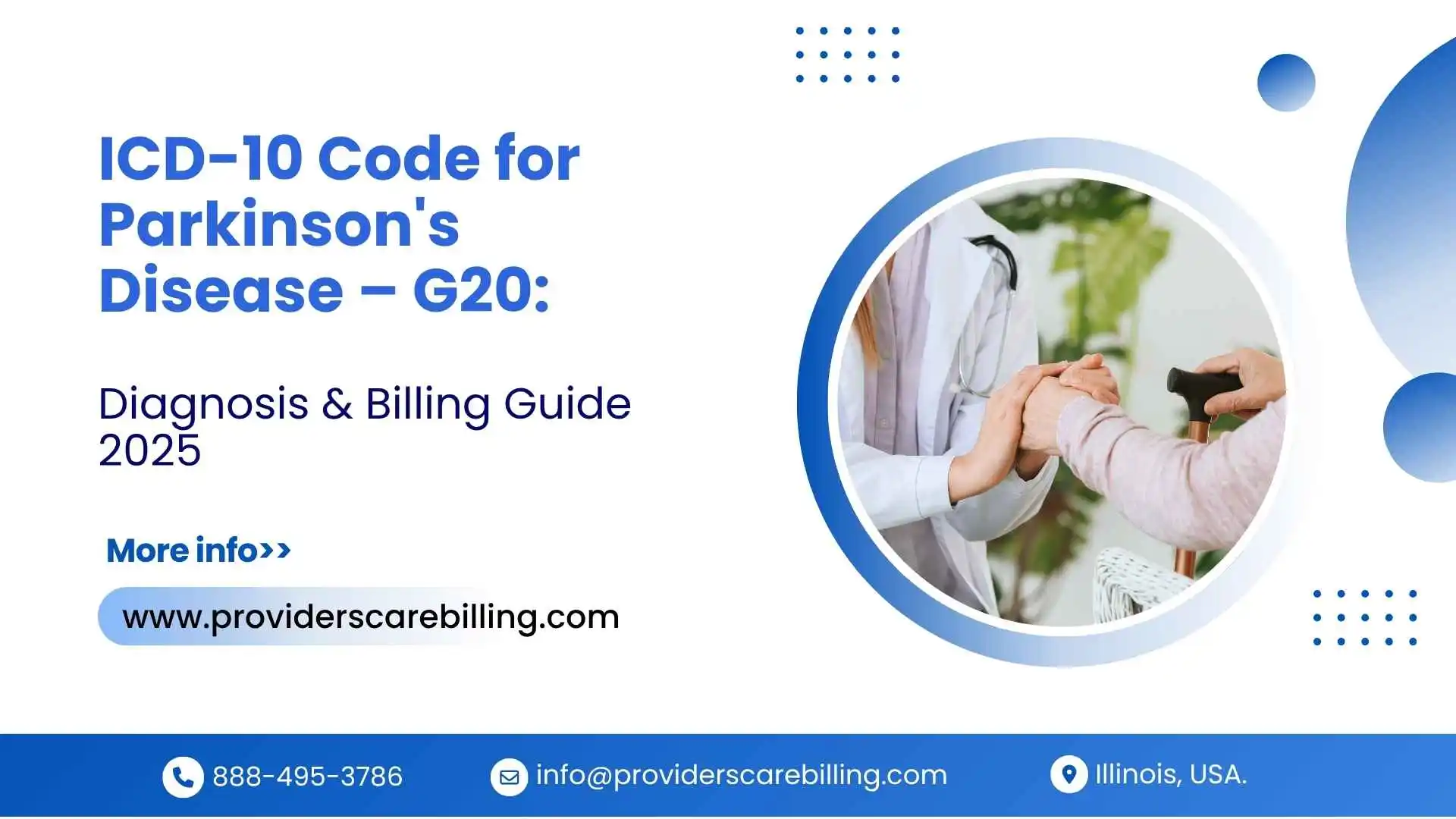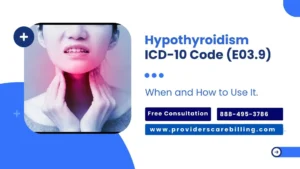Fact: The Parkinson Foundation estimates that around 1 million United States citizens live with Parkinson’s disease, and about 60,000 are diagnosed annually with the disease. However, most medical practices are facing a problem of correct coding and billing of this complicated neurological condition, particularly in relation to Medicare.
Providers Care Billing LLC is a medical billing company in the USA that truly understands how inaccurate coding of Parkinson’s disease ICD 10 (G20) can result in correction requests, audits, or underpayments at great cost. This guide explains the methods of recording, coding, and billing Parkinson’s and its variants with the most suitable ICD-10 codes.
What is the ICD-10 code of Parkinson’s disease?
The code of Parkinson’s disease is G20 ICD-10-CM. It also represents Idiopathic Parkinson’s Disease, which is characteristic of the disease because it lacks any identifiable cause.
Code: G20
Description: Parkinson’s disease (primary/idiopathic)
Enter this code when Parkinson’s disease was already diagnosed by the provider as the most important condition, and no secondary diagnosis was made by the provider.
This code is also known as
- ICD-10 code parkinson disease
- ICD-10 parkinson disease
- parkinson i10
- ICD-10 of parkinson disease
- parkinsons ICD 10
- G20 ICD 10
When to Use G20 – Parkinson Disease ICD-10 Code
G20 can be used when:
- The idiopathic Parkinsonism is confirmed by the diagnosis without dyskinesia.
- No record of secondary causes (e.g., drug-induced, vascular etiology)
- Bradykinesia, stiffness, and tremors are just a few of the hallmark signs of this degenerative condition.
Try not to use G20 in case there are other causes of Parkinsonian symptoms. In such situations, apply a more suitable code (e.g., in cases of secondary Parkinsonism, apply code G21.x).
Common Symptoms That May Support the Diagnosis
The conditions giving this diagnosis the right to be supported using the ICD-10 code G20 are the following signs and symptoms:
- Bradykinesia (movement slowness), Bradykinesia ICD 10 is shown here.
- Resting tremor
- Hardness/stiffness
- Postural instability
- R13.19 dysphagia or related codes
- Reduced expression of the face
- Parkinsonian gait
Those may also co-exist with mental or behavioral symptoms like psychosis or dementia, which, in that case, may need some additional codes as well.
Related ICD-10 Codes for Parkinsonism and Other Conditions
| ICD-10 Code | Description |
| G20 | Parkinson’s disease (idiopathic) |
| G21.0-G21.9 | Secondary Parkinsonism |
| G23.1 | Progressive supranuclear ophthalmoplegia |
| F02.80 | Dementia in Parkinson’s disease without behavioral disturbance |
| F02.81 | Dementia in Parkinson’s disease with behavioral disturbance |
| R13.19 | Dysphagia, not elsewhere classified |
In the case of a neurology clinic in Florida, there were several outright denials of claims due to the use of the code G20, as the providers only used the code Parkinsonism in the notes. The documentation template was upgraded to make the billing team state clearly that the disease is idiopathic parkinson or G21.1 as action in the instances where necessary.
Outcome: The Denial rate decreased by 27 percent, and the average length of time to pay claims fell by 12 days.
Documenting Parkinson’s Disease for Accurate ICD-10 Coding
To maintain proper utilization of G20 ICD 10, the following descriptions should be made by the provider:
- Idiopathic Parkinson’s disease is strictly defined
- Records of typical symptoms (e.g., tremor, bradykinesia)
- No drug-induced or vascular causes
- Severity level and stage of the disease
- Whether dementia, dyskinesia, psychosis, or other consequences are present
Tip: Do not use an ambiguous word such as Parkinsonism unless it is clear. When the type is not specified and it lacks enough information clinically, then G20 might be considered, but one must justify it in the notes.
ICD 10 Coding for Parkinson’s Variants and Complications
In case Parkinson’s disease has any other complications or symptoms, such as psychotic disturbance, then the secondary codes can be used:
- F02.80 / F02.81 dementia with Parkinson(s)
- G24.01 of drug-induced dyskinesia (in the case of)
- R13.19 as a result of Parkinson then dysphagia
- They can be accompanied by:
- ICD 10 code parkinson s disease not otherwise specified
- ICD 10 parkinson disease dyskinesia
- ICD 10 parkinson psychosis
The combination coding will assist in capturing the complexity of care and enhance a better billing outcome.
We are not only a medical billing company; we are your strategic RCM partner. Our experienced and certified coders are able to conform to the changing ICD-10 regulations so that you can spare no cent.
Call Providers Care Billing LLC on the phone today to get your neurology claims audited and receive a free personal consultation.
📞 Call Now: 888-495-3786
📧 Email: Info@providerscarebilling.com
Billing Tips for ICD-10 code G20
Billings have to be done properly with G20:
- Associate symptoms of link, such as bradykinesia or dysphagia in pertinent cases, especially when considering the new code.
- Do not use unspecified codes where they can be more specific, especially when a new code is available.
- Use other codes to indicate the presence of dementia, psychosis, or dyskinesia when present
- Check the payer documentation criteria to prevent denial
G20 applied properly enhances reimbursement accuracy and lowers the level of claims being rejected.
Patients with Parkinson’s disease may also suffer from spinal issues such as spondylosis. For related coding, see the comparison of M47.817 vs M47.896 for lumbar and lumbosacral spondylosis.
CMS Guidelines and 2024 Coding Updates
Code G20 is to be applied in the case of the diagnosis of idiopathic or primary Parkinson’s disease.
- Avoid G20 in case of other causative factors that result in Parkinsonism, like trauma or medications. Use a more specific Parkinsonism ICD-10 code, like G21.
- The G20 code should always be accompanied by a code that pertains to symptoms or related conditions, e.g., R13.19 Dysphagia, unspecified
- F02.80 Another illness in another place F02.80 dementia in other unidentified nonbehavioral disorders
- G20.B2- Parkinsonian dyskinesia, Parkinson’s with fluctuations
Conclusion
The ability to code Parkinson’s disease accurately will not only facilitate reimbursement but also a quality clinical practice. Properly coding Parkinson’s disease with the appropriate ICD-10 code, like G20, and associated symptom codes will, in addition, be in compliance, and it will be optimal in reimbursement. Whether it may be a simple Parkinson’s diagnosis code or a complicated case of dementia or psychosis, there is no need to worry because your billing is in the hands of professionals such as Providers Care Billing LLC. Our team simplifies the complex nature of ICD-10, which provides more time for providers to concentrate on their patients.
Frequently Asked Questions (FAQS)
- What is the ICD-10 code for Parkinson’s with Dementia?
Use G20 with F02.80 or F02.81 based on behavioral symptoms.
- Would G20 be used to code drug-induced Parkinsonism?
No. Use G21.1 instead for drug-induced Parkinsonism.
- Is it possible to use the code G20 with dysphagia codes?
Yes, in case of Parkinson-related dysphagia, combine code G20 with R13.19 and others.
- Are the codes G20.A1 and G20.B2 acceptable?
No. They are not recognized by CMS and are not to be used in billing.





